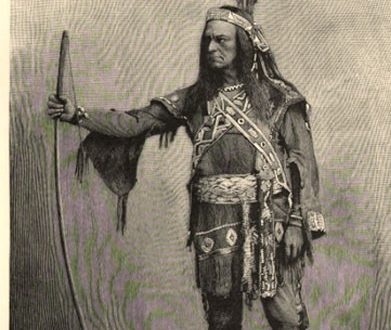Podcast: Play in new window | Download (Duration: 57:26 — 52.6MB)
Just a moment of watching the daily activities of our national public life reveals that ‘performance’ is consequential — far beyond the confines of the playhouse.
In fact, ritual, performance, and theater foster and embody the myths of our culture, the assumptions we hold — often without even being aware of it — and have done so for longer than our country’s existence. What are these assumptions, and how did they come to ground the fundamental way we live our lives?
To find out, we must look back to the earliest stage of America, a stage on which the country’s myths were first performed, as well as critiqued through performance.
Our guest and guide for Staging the Nation is Doug Harvey, author of Theater of Empire: Frontier Performances in America. Harvey’s book is born out of academic research he came to as a kind of second life, garnering his doctorate at age fifty after being in the building trades and working in oil fields for fifteen years.
In his book, Harvey suggests performance culture was a vehicle for imperial transformation from the start, and in his reexamination of the history of the American frontier, sheds light on the differences between the theater of empire — performances concerned only with transaction, often predatory — and that of indigenous cultures — performances centered around cultivating relationships with other humans, and “other-than-humans.”
SEGMENT ONE
We set out to pinpoint what theater of empire means, how it created a culture much different the culture that it dominated, destroyed, and eventually replaced in America. Along the way we discuss its imported and detached nature, and discover the assumptions about life and the land it instilled in American culture, which still drive the way we live our lives today. A quick example is a seeming benign cultural performance that popped up on Facebook today: The Shipshewana Corn Maze in Shipshewana Indiana, which was “created with the goal of quality family fun in the traditional American way…a safe and relaxing event for the whole family [that] gives the next generation an understanding of how corn is grown and used in our food today.”
SEGMENT TWO
From the cynical simulations of Native American rituals performed by pioneers to gain trust and eventually trick tribes out of their lands, to the first traveling circuses of the frontier, to stage plays of the time, we begin to see the differences between theater as genuine communication, as in the case of the “low-born” dancer John Durang, and performance as pure transaction, the elitist ‘punching-down’ M.O. of the high class actor and circus manager John Bernard. We also hear a bit from a play by the late 18th century writer Joseph Doddridge about Chief Logan an Iroquois leader who was a friend of European settlers until his entire family was killed in a massacre. The dialogue stands as a performance that both retells and refutes the assumptions and myths embodied in American frontier culture.
SEGMENT THREE
We continue with a discussion of the much more popular imperial myth of the time and one that continues today—that of the “Noble Savage.” Later we shift to other forms of early frontier performance, including the minstrel act, which paradoxically was a form of class resistance to American imperial culture, while also of course denigrating African Americans. Finally, we’ll wrap up looking at how the performances and portrayal of animals show the differences between the embodied myths of the indigenous culture, and the hollow, detached ones of the imported imperial lifestyle that replaced it.
 GUEST
GUEST
Douglas S. Harvey, author of Theater of Empire: Frontier Performances in America, and adjunct instructor at Johnson County Community College in Kansas City, KS. He’s currently working on a biography of Herman Husband, a Quaker pacifist who spoke in support of the Regulators and took part in the Whiskey Rebellion of 1794.
MUSIC
Traditional Native American Music
“The Ballad of Davy Crockett” music by George Bruns and lyrics by Thomas W. Blackburn, performed by The Wellingtons
“De Boatman’s Dance” (1843) credited to Dan Emmett of Christy’s Minstrels and performed by the modern minstrel reenactment group, the Virginia Minstrels
“Hard Times” performed by Johnny Cash
CREDITS
Producer & Host: Doug Storm
Assistant Producer: Rob Schoon
Board Engineer: Jennifer Brooks
Executive Producer: Joe Crawford
 WFHB Bloomington Community Radio
WFHB Bloomington Community Radio


